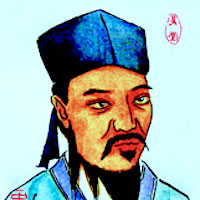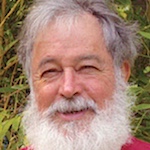

Tao Te Ching

Wu Cheng 吴澄
1249 – 1333 CE
"Mr. Grass Hut"
Important scholar, poet, and professor; Wu Cheng supported and continued the Neo-Confucian movement begun by Zhu Xi. He went further than Zhu Xi’s emphasis on synthesizing the different traditions, included more Taoism, and worked to extend the standard curriculum beyond just the Four Books. He opposed superstitious beliefs and criticized the way scholars understood and practiced divination techniques. He wrote popular commentaries on the Tao Te Ching and most of the classic Chinese texts but his biggest influence was as a teacher and through his students who developed the School of the Mind and Heart during the Ming (1368-1644) and Qing (1644-1912) dynasties.
Eras
Sources
Unlisted Sources
Quotes by Wu Cheng (21 quotes)
“All existence involves contrasting pairs. When one is present, both are present. When one is absent, both are absent.”
Chapters:
2. The Wordless Teachings
Comments: Click to comment
“Whenever there is help, there must be harm. But when Heaven helps, it doesn’t harm, because it helps without helping. Action is the start of struggle. Wherever there is action, there must be struggle. But when sages act, they don’t struggle, because they act without acting.”
Chapters:
81. Journey Without Goal
Comments: Click to comment
“Seeing that the living are soft and the dead are hard, we can infer that those whose virtue is hard and those whose actions are forceful die before their time, while those who are soft and weak are able to preserver their lives.”
Chapters:
76. The Soft and Flexible
Comments: Click to comment
“‘Empty’ means ‘empty like a bowl.’ The Tao is essentially empty and people who use it should be empty too. To be full is contrary to the Tao. ‘Deep’ means ‘what cannot be measured.’”
Chapters:
4. The Father of All Things
Comments: Click to comment
“Desiring external things harms our bodies. Sages… choose internal reality over external illusion.”
Chapters:
12. This Over That
Comments: Click to comment
“The reason sages don’t speak or act is so they can bestow their blessings in secret and … when their work succeeds and people’s lives go well, people… don’t realize it was made possible by those on high.”
Chapters:
17. True Leaders
Comments: Click to comment
“By having less, it’s easy to have more. By having more, it’s easy to become confused”
Chapters:
22. Heaven's Door
Comments: Click to comment
“Those who display themselves don’t shine for long. Those who flatter themselves don’t succeed for long. And those who parade themselves don’t lead for long”
Chapters:
24. Unnecessary Baggage
Comments: Click to comment
“Elsewhere, Lao-tzu extols simplemindedness and weakness over wisdom and strength. Why then does he extol wisdom and strength here? Wisdom and strength are for dealing with the inside. Simplemindedness and weakness are for dealing with the outside.”
Chapters:
33. Know Yourself
Comments: Click to comment
“If rulers could uphold this Tao of effortlessness, without consciously thinking about changing others, others would change by themselves”
Comments: Click to comment
“This is the meaning of Lao-tzu’s entire book: opposites complement each other”
Comments: Click to comment
“To treat the complete as complete, the full as full, the straight as straight, and the clever as clever is mundane. To treat what seems deficient as complete, what seems empty as full, what seems crooked as straight, what seems clumsy as clever, this is transcendent.”
Chapters:
45. Complete Perfection
Comments: Click to comment
“The ten thousand creatures respect the Tao as their father and honor Virtue as their mother… the Way becomes Virtue… Virtue becomes the Way.”
Chapters:
51. Mysterious Goodness
Comments: Click to comment
“Those who plant something well, plant it without planting. Thus it is never uprooted. Those who hold something well, hold it without holding. Thus it is never taken away.”
Chapters:
54. Planting Well
Comments: Click to comment
“Those who possess the Way are like children. They come of age without growing old.”
Chapters:
55. Forever Young
Comments: Click to comment
“A sage’s nonaction is nonaction that is not nonaction… the edge that is not an edge does not cut… the light that is not a light does not blind. All of these are examples of nonaction”
Comments: Click to comment
“The sage seeks without seeking and studies without studying. For the truth of all things lies not in acting but in doing what is natural. By not acting, the sage shares in the naturalness of all things.”
Comments: Click to comment
“All people love a compassionate person as they do their own parents… Hence, those who attack or defend with compassion meet no opposition.”
Comments: Click to comment
“By making ourselves lower than others we can use their wisdom and power as our own. Thus we can win without taking up arms, without getting angry, and without making enemies.”
Comments: Click to comment
“Those who understand yet seem not to understand are the wisest of people… Those who don’t understand yet think they understand are, in fact, the stupidest of people.”
Chapters:
71. Sick of Sickness
Comments: Click to comment
“Evil has its evil reward. Even the clever cannot escape… its retribution is ingenious and beyond the reach of human plans. It never lets evildoers slip through its net.”
Comments: Click to comment
Quotes about Wu Cheng (1 quotes)

“One of the great prose writers of the Yuan dynasty, surpassed only by his student Yu Chi; [Wu Cheng's] commentary shows exceptional originality and provides unique background information It is also noted for its division of the text into 68 verses.”
Comments: Click to comment
Comments (0)